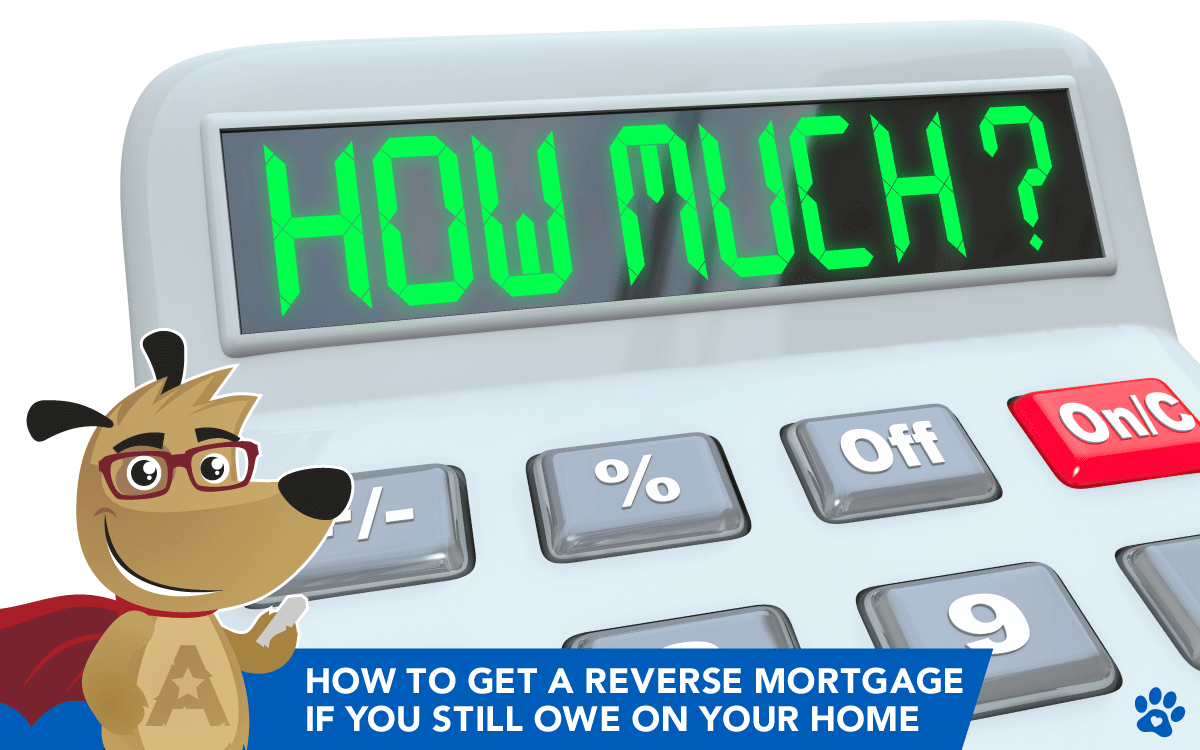
STILL OWE? NO PROBLEM.
How to Get a Reverse Mortgage if You Still Owe on Your Home
 |
Michael G. Branson, CEO of All Reverse Mortgage, Inc., and moderator of ARLO™, has 45 years of experience in mortgage banking, with the past 20 years devoted exclusively to reverse mortgages. A Forbes Real Estate Council member, he developed the industry's first fixed-rate jumbo reverse mortgage and has been featured in Forbes, Kiplinger, the LA Times, and Yahoo Finance. (License: NMLS# 14040) |
 |
Cliff Auerswald, President of All Reverse Mortgage, Inc., and co-creator of ARLO™ — the industry's first real-time reverse mortgage pricing engine — has 27 years of experience in mortgage banking, with 20+ years focused exclusively on reverse mortgages. A recognized expert in reverse mortgage technology and consumer education, he has been featured in Kiplinger, Yahoo Finance, Realtor.com, and HousingWire. (License: NMLS# 14041) |
In this article, you’ll learn:
- How to eliminate your monthly forward mortgage payment with a reverse mortgage
- What expenses will you still be accountable for after eliminating your mortgage payment
- How can you still make payments whenever you choose
- How to get the best deal & highest principal lending limit
The ability to tap into the value of your home by turning its equity into cash can be a powerful tool for someone trying to find a way to expand their financial options for a whole host of reasons. This can naturally lead to questions that could apply to someone’s previously existing traditional or ‘forward’ mortgage.
One of those major questions can be:
If I still have a traditional mortgage I haven’t paid off, can I get a reverse mortgage?
Not only can you potentially get a reverse mortgage if you still have an outstanding traditional mortgage, but you might be surprised to learn that one of the major reasons a senior even bothers with a reverse mortgage in the first place is to eliminate their previously existing forward mortgage payment.
A Home Equity Conversion Mortgage takes the first lien position on the property, so any other mortgages must be paid off to close the reverse mortgage.
The key has enough home equity to qualify.
For some, this means a home that is paid off in full. For others, it may just be having a mortgage balance that is low enough relative to the value of the home.

2026 HECM Reverse Mortgage LTV by Age Chart
This table explores 2026 HECM reverse mortgage benefits by age. See principal limit factors and lending limits for ages 62-90.
Age of Borrower Principal Limit Factor (PLF) Current Lending Limit
62 36.3% $1,249,125
65 38.4% $1,249,125
70 42.0% $1,249,125
75 44.9% $1,249,125
80 49.3% $1,249,125
85 55.4% $1,249,125
90 62.3% $1,249,125
Note: Principal Limit Factors (PLF) sourced from HUD.gov, based on an expected rate of 5.875%. Net PLF requires deducting costs, including upfront insurance (~3%).
The burden of a forward mortgage payment for retirees
Forward, or “traditional,” mortgage payments represent a severe financial burden for anyone who has one, whether for new homeowners still in the middle of their working lives or seniors in or nearing retirement.
Still, having a traditional mortgage payment in retirement tends to hit seniors much harder than their younger counterparts because seniors often live on a fixed income from accounts like 401Ks or IRAs and Social Security benefits.
Many seniors can only count on their Social Security benefits, making the burden of a forward mortgage more painful to bear.

More financial peace of mind
Replacing your forward mortgage with a reverse mortgage means the need to make that monthly forward mortgage payment is gone. Reverse mortgages do not require monthly mortgage payments as long as you live in the home as your primary residence and maintain it in line with the guidelines presented by the Department of Housing and Urban Development (HUD).
Staying current on your property taxes and homeowners’ insurance would be best. Leveraging a reverse mortgage can allow you to relieve a lot of financial stress by saying goodbye to the constant necessity of needing to make your monthly mortgage payment.
Eliminating that part of your monthly expenses can allow you to plan ahead for other unexpected fees if they come up or free up more cash for you to do other important things.
Still want to make payments? You can.
Because a reverse mortgage is a “negatively amortizing” loan, its balance grows over the life of the loan. Like with any loan, interest accrues over time. Some people do not know that even once a reverse mortgage is in place, you can still make payments toward the loan balance.
Borrowers always have the option to make payments as they would like if they are able. Some borrowers who work on commission, such as Realtors, even approach the reverse mortgage to make payments when they receive commissions.
This enables them to keep the loan balance lower than if they made no payments.

Pro Tips
Before signing up for any reverse mortgage, pay close attention to the lender’s closing costs and interest rates! Sadly, many seniors apply with celebrity advertisers seen on TV when they should be shopping multiple sources for the best deal.
Shop the Rate
Reverse Mortgage lenders set their own margins and interest rates. The lower the interest rate at the time of application, the more cash proceeds become available to YOU! This is one little-known secret to receiving the largest principal lending limit.
Ignore the Rhetoric
Ignore sales pitches that include “We’re the largest” and “We’re —–” Blah! FHA is the largest and the one that backs your federally insured loan, NOT the loan originator.
Take advantage of ARLO, the All Reverse Loan Optimizer, which can help you shop around for the best rates and products to find one that fits your financial situation best.

 Michael G. Branson
Michael G. Branson Cliff Auerswald
Cliff Auerswald

February 19th, 2024
February 20th, 2024
December 3rd, 2025
December 3rd, 2025
November 9th, 2023
November 15th, 2023
November 5th, 2023
November 9th, 2023
December 28th, 2022
December 31st, 2022
April 26th, 2022
May 2nd, 2022
January 11th, 2022
January 11th, 2022
October 25th, 2021
November 2nd, 2021
December 17th, 2020
December 17th, 2020
June 18th, 2020
June 18th, 2020
July 9th, 2023
July 12th, 2023
May 17th, 2019
May 17th, 2019
May 15th, 2019
May 15th, 2019